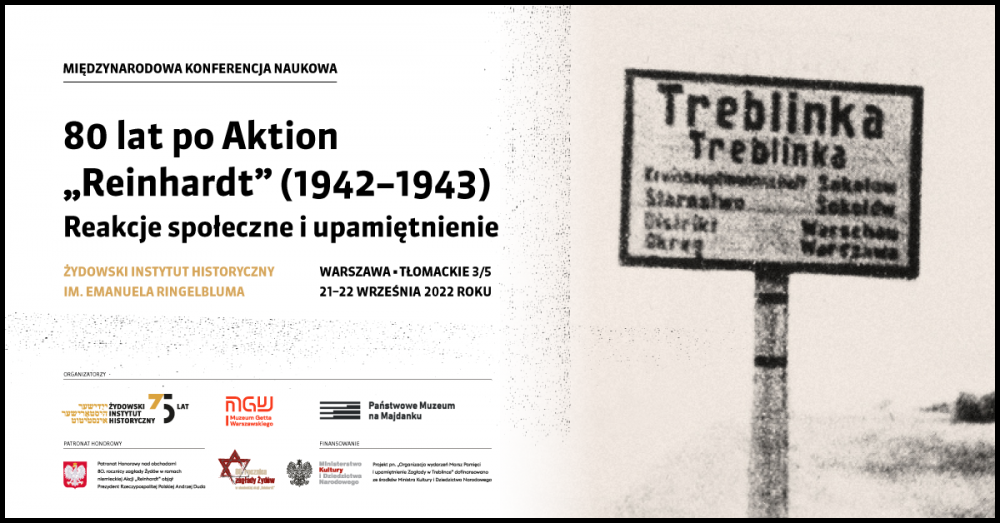Menu
- News
- Events
- Oneg Shabbat
- Collections
- Research
- Exhibitions
- Education
- Publishing Department
- Genealogy
- About the Institute
- Bookstore


Thinking of those who could only be seen for a short time, on the way,
between one wave of transport and another, an epical panic strikes me.
They vanish, fleeing from my memory.
(Bogdan Wojdowski, Chleb rzucony umarłym [Bread For The Departed])
The conference will be transmitted: https://www.youtube.com/watch?v=HnrOQFMOdpo
In the spring of 1942, the Germans – under the codename Aktion Reinhardt – began to exterminate Polish Jews in the General Government district of German-occupied Poland. The Warsaw Ghetto was the largest World War II ghetto in German-occupied Europe. The largest number of Jews was transported to their deaths to the Treblinka death camp between 22 July and Yom Kippur (21 September) 1942. For eight weeks, the rail shipments of Jews to Treblinka went on without stopping. By November 1943, when the Treblinka death camp was closed, more than 1,5 million Jews from Poland and other European countries were murdered in the so-called Aktion Reinhard. The planned conference, held by the Warsaw Ghetto Museum and the Emmanuel Ringelblum Jewish Historical Institute, marks the 80th anniversary of launching the annihilation campaign against Polish Jews. The conference is scheduled to take place in Warsaw in September 2022.
The first goal of this scholarly gathering is to explore the patterns of social and individual responses of the two societies, Jewish and Polish, during the period of terror and mass deportations to the death camps and the months of the extermination. The second goal is to explore and compare the course of the liquidation operations in the Warsaw Ghetto and different places of five districts of the General Government and their consequences for the Jewish communities and Polish-Jewish relations. Finally, the third goal is to examine the commemoration patterns of Aktion Reinhard’s former camps developed in Poland in the last decades. For example:
See the conference program:
Organizing committee: prof. dr hab. Andrzej Żbikowski (JHI), dr. Martyna Grądzka-Rejak (WGM), prof. Daniel Blatman (WGM).
Conference organizers:
![ŻIH_logo_EN.jpg [62.88 KB]](https://www.jhi.pl/storage/image/core_files/2021/1/25/577483e974f1d6a76944a8475e4bb6c5/jpg/jhi/preview/IH_logo_EN.jpg)
![WGM_EN_Brightred.png [48.82 KB]](https://www.jhi.pl/storage/image/core_files/2021/12/22/ab379b80e2356f53bb11cdfc15449d28/png/jhi/preview/WGM_EN_Brightred.png)
![Muzeum_Majdanek_logo_2022.png [4.29 KB]](https://www.jhi.pl/storage/image/core_files/2022/3/4/aefe13c0a34cf2c1f1b6dce4d15c9a43/png/jhi/preview/Muzeum_Majdanek_logo_2022.png)
_____
![godlo_polski.png [159.74 KB]](https://www.jhi.pl/storage/image/core_files/2022/5/18/06c6c436123fe09134c429cc8cc72c2e/png/jhi/preview/godlo_polski.png)
Commemoration of the 80th anniversary of the extermination of Jews as part of the German Operation "Reinhardt" is under the Honorary Patronage of President of the Republic of Poland Andrzej Duda
![presidentpl_na_niebieskim_2022.jpg [30.06 KB]](https://www.jhi.pl/storage/image/core_files/2022/3/22/89ecd0fc11be8a4b817ceadc5ea0536e/jpg/jhi/preview/presidentpl_na_niebieskim_2022.jpg)
The project "As if we had never existed" was co-financed by the Minister of Culture and National Heritage
![MKiDN_kolor-eng_od_11.2021.jpg [187.51 KB]](https://www.jhi.pl/storage/image/core_files/2022/1/5/a3fdc096cbdfaeccd0b49be77923fea9/jpg/jhi/preview/MKiDN_kolor-eng_od_11.2021.jpg)
The conference is organized as a part of the 80th anniversary of the “Aktion Reinhard”, a program financed by the Ministry of Culture and National Heritage.
![Reinhard_80rocznica-EN transparent light.png [106.99 KB]](https://www.jhi.pl/storage/image/core_files/2022/1/20/b44330260bf6857bc2d3631d1c1678d8/png/jhi/preview/Reinhard_80rocznica-EN%20transparent%20light.png)